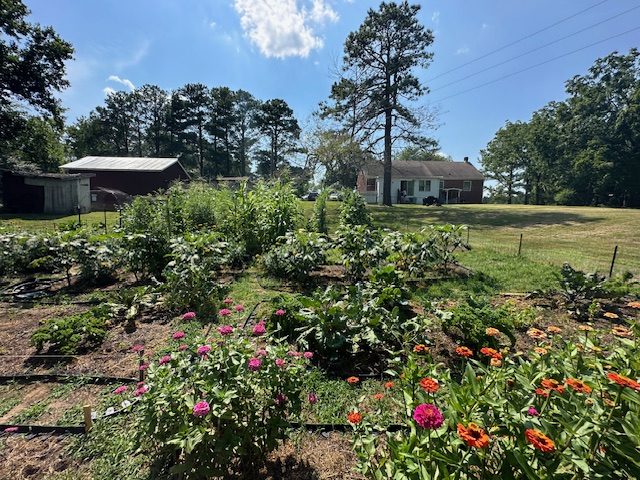
Farmer name: Jay L. Richardson Grebe (she/they), Just Harvest
Acreage: three acres, small land plots
Location: Virginia’s Northern Neck and Middle Peninsula
Method of Access: Inheritance, city lease
Year Founded: 2022
Affordability Tools: self-funded, donations
Farm Operation: Vegetables
What started as a 4×4 garden bed on her grandmother’s land became a personal journey for Jay Richardson Grebe, both to reconnect with her family’s agrarian history and to join the movement to unite Black and Indigenous communities through food. Jay is an Indigenous woman, a descendant of the Powhatan Confederacy, with direct lineage to the original peoples of modern-day Virginia. Jay is reconnecting with Indigenous heritage through land and cultivation.
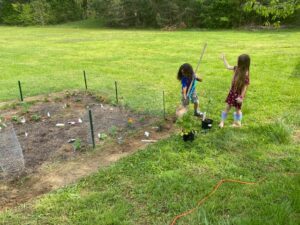
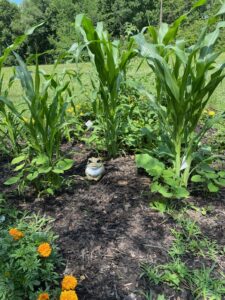
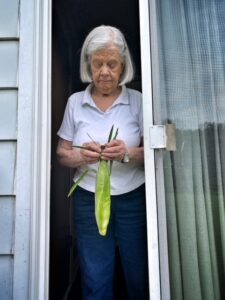
Jay’s grandmother, Emily Richardson, is 92 years old and lives on the three-acre plot she purchased over 60 years ago in Caroline County, Virginia. Jay’s daughter inspired the women to begin growing a small garden at Emily’s home because Jay and her daughter live in a place that does not permit garden beds. After a few trials by Jay, Emily, an avid gardener, started helping out and eventually shared indigenous growing practices and ancestral knowledge, inspiring her to share more of her people’s stories and teachings.
Digging deeper into the Richardson family reveals a history of racial injustice that left many Indigenous communities fighting to reclaim their identity. The Racial Integrity Act of 1924, landmark legislation in Virginia, reflected the deeply entrenched racial prejudices of its time. Enacted during the height of the eugenics movement, the law aimed to uphold racial purity by prohibiting interracial marriage and defining a person as either “white” or “colored” based on the infamous “one-drop rule,” which classified anyone with even a trace of non-white ancestry as non-white. The Racial Integrity Act stands as a stark reminder of the systemic discrimination and segregation that persisted in American society for decades, leaving a lasting legacy of inequality and injustice. The portion of the law prohibiting interracial marriage was overturned in 1967 by the U.S. Supreme Court in Loving v. Virginia.
The Racial Integrity Act not only institutionalized racism but also perpetuated the marginalization and disenfranchisement of Native communities. Jay shared how her grandmother and others fought through the bureaucratic “paper genocide” for decades to regain their indigenous status on their birth certificates from the binary system of “white” or “colored.”
The Richardson family history is directly impacted by racism, colonization, and the custom of migrating away from home for more opportunities. “My mom was the first to move out of Virginia to start a new life.” Jay explained that her great-grandmother owned land not too far from her grandmother’s plot, but eventually, her eight children sold the land. Neither her mother nor her sisters are currently interested in stewarding their mother’s three acres. Jay believes they will likely inherit their grandmother’s land, and plans to convert the home into a headquarters for the nonprofit she started, Just Harvest.
Jay is one of the four founders and is Executive Director of Just Harvest, a nonprofit organization committed to empowering Black, Indigenous, and marginalized communities to achieve independence and autonomy through food sovereignty and community connectivity. Jay also serves on the University of Virginia’s resilience workgroup, which identifies social determinants of health and the best ways to address arising needs. “This is an agrarian area, and we live in a food apartheid,” explained Jay, describing a local rural community with many farms but little access to the produce grown there. “All the food ends up going out for processing and doesn’t come back unless it’s in a can. We can’t get organically grown produce at the few local grocery stores.” The small garden at her grandmother’s home has expanded into a 2500 square foot mutual aid garden, with tours and workshops for community members.
Just Harvest has established cultural gardens at a local school and heritage gardens in Warsaw, VA. Along with food staples, crops like amaranth, squash, corn, and beans are grown using Indigenous science and Traditional Ecological Knowledge, encompassing the understanding of ecosystems, biodiversity, resource management, and sustainable practices developed by Indigenous and local communities over centuries of living closely with nature. These gardens have the specific intention of connecting Black and Indigenous communities and exemplify knowledge and cultural exchange. “People are so excited to share plants. It’s all goodwill,” says Jay. Just Harvest believes that food sovereignty requires cultural healing.
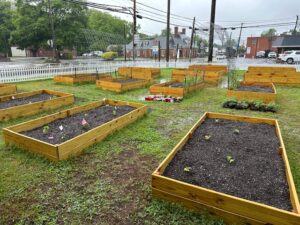
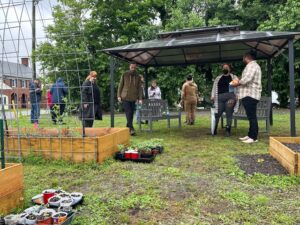
In May 2024, Just Harvest entered into a lease agreement with the Essex County Board of Supervisors to steward 0.12 acres for a community garden and food distribution project. The lease terms include a zero-dollar lease for the site, which covers one year, with the option to renew for the next two years. “We pitched the idea publicly at the board meeting and got a unanimous decision. It took a year to plan because we weren’t sure how a zero-dollar lease would work, but we figured it out.” According to a local news article, “Just Harvest must utilize the property for the development, operation, and management of a community garden and related structures for demonstration, educational, and charitable purposes.” The vision for the space is to create a community garden and an outdoor education space and address food security by distributing fresh-grown produce.
